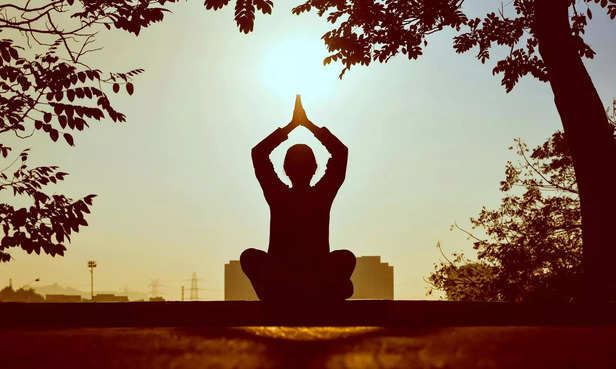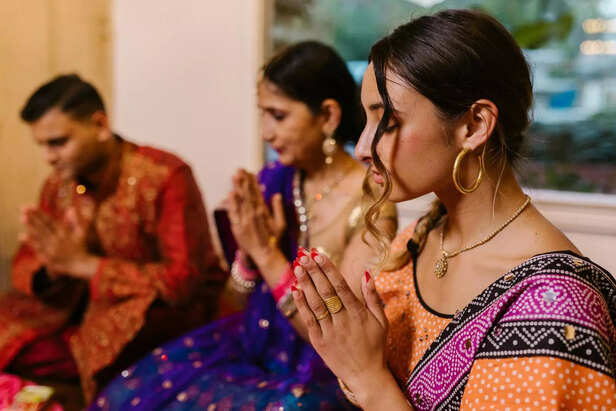Hinduism Is Not a Religion—It’s a Way of Life
Riya Kumari | Mar 12, 2025, 15:18 IST
( Image credit : Timeslife )
If you think Hinduism is just another religion, you’re missing the point. It’s not a system of rules. It’s not a club you join. It doesn’t demand blind faith or threaten you with eternal consequences. Instead, it hands you the vastness of existence and simply says, Look. Think. Understand. Unlike most religions, Hinduism doesn’t claim to have just one path to truth. It gives you many—because it knows people are different, and truth is not a one-size-fits-all concept. It doesn’t hand you an answer; it hands you a mirror. And what you see depends on where you stand.
Hinduism is not something you believe in. It’s something you live. This is where most people get it wrong. They think it’s like other religions—bound by rules, defined by a single book, led by one prophet. But Hinduism has no founder, no strict doctrine, no “one right way” to do things. It doesn’t demand blind faith. It doesn’t say, “Follow this or else.” Instead, it invites you to explore, question, and understand. It doesn’t tell you what to think. It teaches you how to think. And that’s why it has lasted for thousands of years—because it grows with you.
1. Truth Is Not a Fixed Destination

Most religions say, “This is the truth. Accept it.” Hinduism says, “Here are some paths. Walk and see where they take you.” In Sanskrit, it’s called Sanatana Dharma—the eternal way. But unlike dogma, it’s not static. It evolves as the world evolves, because truth is not one-size-fits-all. What is true for a monk meditating in the Himalayas is different from what is true for a mother raising three children. And Hinduism understands that.
That’s why there are so many different approaches within it. The path of knowledge (Jnana Yoga). The path of devotion (Bhakti Yoga). The path of action (Karma Yoga). The path of meditation (Raja Yoga). Each one is valid. Each one leads to understanding. The question is not “Which one is right?” The question is “Which one is right for you?” And maybe, at different points in life, your answer will change. That’s okay. Hinduism leaves space for you to grow.
2. You Are the Creator of Your Own Reality

Karma is not punishment. It’s not some divine scoreboard keeping track of sins and virtues. It’s cause and effect, action and consequence. It simply means: Your choices shape your life. The world is not happening to you. It’s happening through you. What you think, how you act, the energy you put out—it all comes back. Not because some deity is keeping score, but because that’s the nature of existence. Plant a seed, and it grows. Throw a rock in the water, and ripples spread. The life you live is a reflection of the choices you make.
This is not a comfortable truth. It’s much easier to believe that life is random, that we are victims of fate. But Hinduism doesn’t give you that escape. It hands you responsibility. It says, If you don’t like your life, change your actions. If you don’t like your patterns, change your thinking. Liberation (moksha) is not something given to you. It is something you create.
3. God Is Everywhere—Or Nowhere at All

Some people say Hinduism is polytheistic. Others say it’s monotheistic. The truth? It’s both. And neither. Because Hinduism understands something most people struggle with: God is not a person. God is an experience. That’s why there are so many deities—not as separate beings, but as different aspects of the same ultimate reality. Shiva represents transformation. Lakshmi represents abundance. Saraswati represents wisdom. The divine is not limited to one form because the universe is not limited to one form. You see what you are ready to see.
And if you don’t believe in God at all? That’s fine, too. Hinduism does not collapse without a deity. You can still follow the path of truth, wisdom, and self-realization without ever offering a single prayer. Because God is not the point. Understanding is.
4. You Are More Than This Life, More Than This Body

In the West, people fear death because they see it as an ending. Hinduism sees it as a continuation. Reincarnation is not about reward and punishment. It’s about learning. Each life is a lesson, an experience, an opportunity to grow. You are not a single moment in time. You are an unfolding journey. And if you don’t get it right this time, you will have another chance. And another. Until, one day, you understand enough to be free.
Moksha—the end of the cycle—is not about going to heaven. It’s about waking up. Realizing that you were never just this body, this name, this identity. You were always something greater. And when that truth fully sinks in, the cycle ends. Not because you earned salvation. But because you finally understood that you were never separate from it in the first place.
Hinduism Is Not a Religion—It’s a Mirror
It does not tell you what to believe. It reflects who you are.
If you are afraid, it gives you faith.
If you seek knowledge, it gives you wisdom.
If you crave meaning, it gives you depth.
If you want freedom, it shows you the way.
But it does not force you. It does not demand.
It simply offers. And that is why Hinduism is not a religion.
It is a way of life.
A way of seeing.
A way of being.
And the best part? You’ve been living it all along.
1. Truth Is Not a Fixed Destination

Path
( Image credit : Pexels )
Most religions say, “This is the truth. Accept it.” Hinduism says, “Here are some paths. Walk and see where they take you.” In Sanskrit, it’s called Sanatana Dharma—the eternal way. But unlike dogma, it’s not static. It evolves as the world evolves, because truth is not one-size-fits-all. What is true for a monk meditating in the Himalayas is different from what is true for a mother raising three children. And Hinduism understands that.
That’s why there are so many different approaches within it. The path of knowledge (Jnana Yoga). The path of devotion (Bhakti Yoga). The path of action (Karma Yoga). The path of meditation (Raja Yoga). Each one is valid. Each one leads to understanding. The question is not “Which one is right?” The question is “Which one is right for you?” And maybe, at different points in life, your answer will change. That’s okay. Hinduism leaves space for you to grow.
2. You Are the Creator of Your Own Reality

Meditate
( Image credit : Pexels )
Karma is not punishment. It’s not some divine scoreboard keeping track of sins and virtues. It’s cause and effect, action and consequence. It simply means: Your choices shape your life. The world is not happening to you. It’s happening through you. What you think, how you act, the energy you put out—it all comes back. Not because some deity is keeping score, but because that’s the nature of existence. Plant a seed, and it grows. Throw a rock in the water, and ripples spread. The life you live is a reflection of the choices you make.
This is not a comfortable truth. It’s much easier to believe that life is random, that we are victims of fate. But Hinduism doesn’t give you that escape. It hands you responsibility. It says, If you don’t like your life, change your actions. If you don’t like your patterns, change your thinking. Liberation (moksha) is not something given to you. It is something you create.
3. God Is Everywhere—Or Nowhere at All

Universe
( Image credit : Pexels )
Some people say Hinduism is polytheistic. Others say it’s monotheistic. The truth? It’s both. And neither. Because Hinduism understands something most people struggle with: God is not a person. God is an experience. That’s why there are so many deities—not as separate beings, but as different aspects of the same ultimate reality. Shiva represents transformation. Lakshmi represents abundance. Saraswati represents wisdom. The divine is not limited to one form because the universe is not limited to one form. You see what you are ready to see.
And if you don’t believe in God at all? That’s fine, too. Hinduism does not collapse without a deity. You can still follow the path of truth, wisdom, and self-realization without ever offering a single prayer. Because God is not the point. Understanding is.
4. You Are More Than This Life, More Than This Body

Hindu
( Image credit : Pexels )
In the West, people fear death because they see it as an ending. Hinduism sees it as a continuation. Reincarnation is not about reward and punishment. It’s about learning. Each life is a lesson, an experience, an opportunity to grow. You are not a single moment in time. You are an unfolding journey. And if you don’t get it right this time, you will have another chance. And another. Until, one day, you understand enough to be free.
Moksha—the end of the cycle—is not about going to heaven. It’s about waking up. Realizing that you were never just this body, this name, this identity. You were always something greater. And when that truth fully sinks in, the cycle ends. Not because you earned salvation. But because you finally understood that you were never separate from it in the first place.
Hinduism Is Not a Religion—It’s a Mirror
If you are afraid, it gives you faith.
If you seek knowledge, it gives you wisdom.
If you crave meaning, it gives you depth.
If you want freedom, it shows you the way.
But it does not force you. It does not demand.
It simply offers. And that is why Hinduism is not a religion.
It is a way of life.
A way of seeing.
A way of being.
And the best part? You’ve been living it all along.
